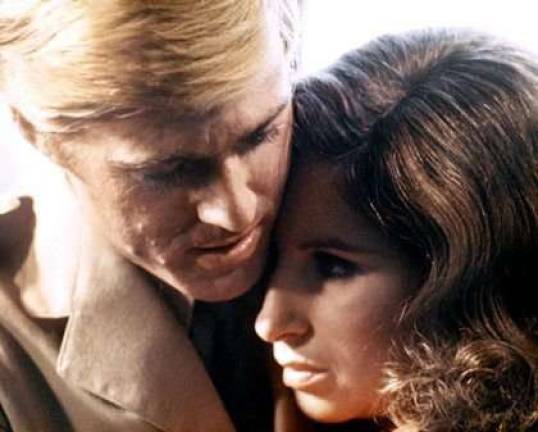Remembering "The Way We Were" Composer Marvin Hamlisch

The first thing I thought upon hearing that Marvin Hamlisch, the highly-decorated film and theater composer, had passed away, was "How old was he?" The second thought I had, upon hearing that he was only 68 when he died from a brief illness, was "How did he do so much?" Well, he sure did start early. In 1951, when he was six-years-old (SIX!), he received admission into what is now the Juilliard School Pre-College Division. His first job was as a rehearsal pianist for Funny Girl, starring Barbra Streisand. The two would later collaborate on one of the most memorable movie themes of all time, the theme to The Way We Were, starring Streisand and Robert Redford. It was Streisand's first number one single in the United States and the American Film Institute ranked the song number eight on its list of Top 100 Songs from Film. (I would have ranked it higher ? for me, it's on par with "Moon River," "Over the Rainbow," and "Singin' in the Rain" as the greatest.) Hamlisch scored the rarest of triples in 1973, winning two Oscars for his musical contributions to The Way We Were and a third for his ragtime-themed score adaptation to The Sting (also starring Redford), the year's Best Picture. More plaudits came ? including a Pulitzer and a Tony ? for Hamlisch's musical work on A Chorus Line, for me the most valuable piece of architecture in the landscape of modern musical theatre. Line follows an audition of a bunch of gypsies hoping to get cast in a musical. These aren't people on the brink of their big break. There's no fame or fortune on the line, just a gig that will hopefully pay their rent and feed their soul. Working with Michael Bennett, Nicholas Dante, James Kirkwood and Edward Kleban, Hamlisch helped turn the show into more than just a singular sensation. Line held the record for longest-running Broadway show for years, and, more significantly, became the focal point of the New York City tourism campaign, drawing in crowds in a turbulent and scary pre-Giuliani New York. I also happen to be slightly biased towards this show. My parents caught it on the very day they learned they were expecting me, which means I have known this music perhaps for longer than my entire natural life. And his music has continued to follow me: Hamlisch also scored such favorite movies of mine as Frankie and Johnny, Ordinary People, Shirley Valentine, Sophie's Choice, Starting Over, and Three Men and a Baby. He is one of only eleven artists to hold an Emmy, Grammy, Oscar and a Tony, and only two to also claim a Pulitzer (the other is another inspiring composer: Richard Rodgers). The full value of Hamlisch's career ? so prolific, and yet still cut short ? has yet to be realized. But below, a few of the man's very best: The Way We Were: This aforementioned theme from the Sydney Pollack blockbuster had it all: reflection, sadness, and one sweeping build. And with Streisand at the microphone, Hamlisch (who co-wrote with the team of Alan and Marilyn Bergman) was blessed to have voice of the century ? at its peak ? bringing it to life. It's a classic for the ages. (One fun fact: the first word of the song was originally to be "Daydreams." It became "Memories.") At the Ballet: Of the many Line songs I could pick, including "Nothing," "What I Did for Love," and "One," I chose one of its saddest. In it, three of the show's auditioners open up about what was missing or hurtful in their lives, and how dance ? specifically, ballet ? gave them a home they lacked otherwise. It shades in all sorts of character information, and reminds us in the audience why even the smallest of roles can equal the greatest of victories. (Fun fact: Kelly Bishop of "Gilmore girls" and "Bunheads" sang the role of Sheila on this song and in the show, and won the Tony for it.) Nobody Does it Better: Anyone who can remember the initial tickling of the ivories in this Bond song (from The Spy Who Loved Me) knows exactly why this song belongs on the list. Carole Bayer Sager provided the lyrics and Carly Simon (who'd later pen another immortal film theme, Working Girl's "Let the River Run") make this an early power ballad masterpiece. Sure, it's no Goldfinger; it's better. Through the Eyes of Love: Another 1970s film, another love theme, another collaboration with Bayer Sager, another Oscar nomination. This tune, from the Robby Benson flick Ice Castles, may lay it on thick. But it's quality Velveeta. Melissa Manchester sang the theme, which became a wedding-song staple. The Girl Who Used to Be Me: This one comes from the Lewis Gilbert version of the Billy Russell play Shirley Valentine, starring an incandescent Pauline Collins. Both the actress and the song (which Hamlisch wrote in concert with the Bergman team) received Oscar and Golden Globe nominations for this story of a simple Liverpool housewife who goes to Greece and changes her life forever. But before we even see Collins, we already have quite an idea of where Shirley has been and where she is heading, thanks to a heroic rendition by Patti Austin (you can catch her performance of this at the 1990 Oscars on YouTube. It's worth it.) Among the lines in the chorus is this one: "Oh, the girl who used to be me, she could fly, she was free/ And she wrote all the words to her song." Williams may not have written all the words to his own songs, but he sure did create some of the most memorable music of all time. Hamlisch, baby, you were the best.